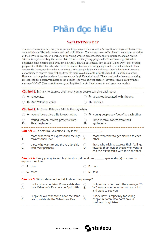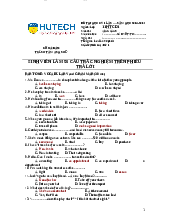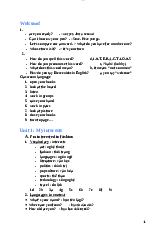


Preview text:
lOMoARcPSD|46342985 lOMoARcPSD|46342985 THE UK I. Form of government
-The United Kingdom (UK) operates under a parliamentary democracy and a
constitutional monarchy. This means it has a monarch (currently King Charles III) who
serves as the ceremonial head of state. At the same time, the country is governed by
elected ofÏcials through a parliamentary system.
Monarch: The monarch's role is largely symbolic, involving ceremonial duties,
representing the country, and granting royal assent to legislation passed by Parliament.
However, they do not engage in day-to-day governance.
Parliament: The UK Parliament is the supreme legislative body, comprising the
elected House of Commons and the appointed House of Lords. It's responsible for
making laws, overseeing the government, and representing public interests.
Prime Minister: The head of government, typical y the leader of the majority party in
the House of Commons. They lead the executive branch, administer government
policies, represent the UK international y, and are appointed by the monarch to form a
government and make key policy decisions.
Constitution: The UK does not have a single written constitution like some other
countries. Instead, its constitution is made up of a combination of statutes, common
law, conventions, and traditions. Key constitutional documents include the Magna
Carta, the Bill of Rights, and various Acts of Parliament
Overal , the form of government in the UK is characterized by a blend of
monarchy, parliamentary democracy, and constitutionalism, with power
distributed among the monarch, Parliament, and the Prime Minister.
Structure of State in UK
The UK state was founded on a monarchy constitution with the prime minister
assuming the position of head of government. (According to the explanation
most scholars believe Britain is still a unitary state and is showing signs of becoming a federal state). lOMoARcPSD|46342985
-Unitary Sovereignty: Sovereignty is a separate right of a nation exercised
within its scope exclusive economic zone and continental shelf. So sovereignty
only applies at the central level, not applicable at a local level -Legal System:
+Parliament is the legislative body of the United Kingdom. The British Parliament
is bicameral, consisting of an elected House of Commons and a Senate - the
majority of members are hereditary nobles, lifelong nobles, and bishops of the Church of England.
+ The Senate and House of Representatives are both parts of the legislature. A
law must be approved by both chambers to be enacted.
+According to the Anglo-Saxon legal system that exists in England, local
government. The locality does not have the dependence and sponsorship
of superiors. All levels of government are subject to the law
-Territory: England is divided into 3 levels of administrative units: county;
district, borough, and parish. The structure of local government varies by region. -Government system:
The representative body of power (legislature) of the United Kingdom is
the parliament headed by the Monarch, currently King Charles III.
The executive branch in the UK is the government headed by the Prime
Minister of the United Kingdom, currently R ishi Sunak since 2022.
The Judical branch is UK Supreme Court (UKSC) POLITICAL REGIME
In the United Kingdom, the 'Cabinet Manual' delineates the laws, rules,
and customs of the government. It is a parliamentary democracy with a
constitutional monarchy, a sovereign Parliament, a government
accountable to Parliament, and an independent judiciary. The UK
government advocates for liberal democracy, including regular elections,
respect for civil and political rights, and oversight by Parliament, the
media, and civil society. Additionally, the UK promotes democratic and human lOMoARcPSD|46342985
rights principles such as participation, accountability, transparency,
equality, and non-discrimination, viewing them as both goals and means
to advance other aid objectives like poverty reduction, prosperity, and peace.
Education in UK is vital for democracy, fostering civic engagement, critical thinking,
and understanding democratic principles. Schools teach about the democratic
process, rule of law, human rights, and civic participation, empowering informed
citizens to contribute actively to democracy.
In democracy, persuasion is key as individuals and groups advocate for
their interests through various means like speeches, debates, media
campaigns, and grassroots efforts. This facilitates informed decision-
making and consensus-building by presenting and debating different viewpoints.
UK democracy empowers citizens through community organizing,
participatory budgeting, and consultation mechanisms. This allows people
to shape policies that affect them, ensuring diverse perspectives are heard and valued in decision-making
Compromise is essential in UK democracy, especially in its diverse society.
It entails finding middle ground, making trade-offs, and reconciling
competing priorities through negotiation and dialogue among stakeholders to advance collective goals.




